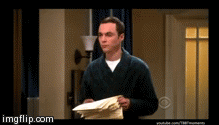50 Levels of Criticism
(Note: this post is NOT about 50 Shades of Grey, although I use the book as the jumping off point for the real point of this post.)
Most of you know I am a voracious reader. I absorb books the way my skin sucks up moisturizer in the winter months. To start, I had at best, a passing interest in the 50 Shades trilogy and so didn't bother with it for a long time. After all, my TO-READ list is l o n g and no matter how popular a book is, if it doesn't interest me on some level, I'm not going to bother. Case in point: I still haven't read The Fault in Our Stars and I don't really care if I ever do. I've read a couple of Nicholas Sparks books and I can honestly say that if you've read one "true-love/fatal disease/we'll-always-be-together-no-matter-what-comes-between-us" crap story you've read them all. (Forgive my antagonism, but I really hate Nicholas Sparks. It's formulaic storytelling that makes Harlequin Romances seem original.)
Still, having a mild curiosity, I tried reading it once, long ago, and dear God, I couldn't get past page ten. I skipped ahead, hoping it was just the intro that was boring. And I was wrong. So after spending about 30 minutes of my life on the book, I reached this conclusion:
That was over a year ago.
Then the movie got made and the whole thing got even more attention. Not all of it good.
I have friends on both sides of the 50 Shades debate. Some think it is harmless erotic escapism. Others are repulsed by the story and point out that Christian Grey is an abusive sexual predator. I became more curious, simply by the vehement levels of passion on both sides of the debate. People who defend it get just as much spit and fire in their breath as those who vilify it. Clearly, I had to form my own opinion, so I checked it out again and this time, forced myself to read it. Yes, I say forced because I mean forced.
I'm not going to get into the debate about whether the book glorifies abuse or whether Ana was this or Christian was that.
Here's what I want to talk about:
I was engaged in a discussion about the book with *Christine, and as she was asking for my opinion, I explained that I was only on chapter thirteen, but the book was freaking atrocious. (I still feel this way.) I went on to discuss what was of real issue with me - the actual writing.
Seriously? One of the top five worst books I've ever read - and that's saying something. I told Christine I thought the characters were flat, dumb, and one-dimensional. Saying the prose was mediocre would be generous, and the dialogue was stilted and forced in the best cases.
Yeah....she (a devout fan of the trilogy) accused me of being too critical when I read. She said I needed to stop worrying so much about things like character, voice, tone, pacing, etc., and just enjoy a good story when I read it and enjoy it for the story, regardless of how well it is written.
When I passed this tidbit onto a friend who despises the books with everything inside of her, she agreed the writing is God-awful and also mentioned that maybe it's not such a bad thing to forgive some things now and then. (Which I do - but hating a book is a lot like hating a person or a bad TV show - once you start noticing the things that are stupid, suddenly that's all you see. It's like a twisted version of "I, Spy.")
Now, I confess, whether on purpose or not, I make a lot of observations when I read. It's just how I am. Often, those observations are...cutting. (To be fair, after I've written a draft of my review of any book, I always google other reviews from various sources - everything from casual readers impressions to the opinion of professional critics. Most often, when my review boils down to "this book was lame" - I'm not alone in my opinion. But I like knowing what other people are thinking.)
Finally, as I look back on my previous book reviews, I have to point out that my critiques are not so much like that of a professional critic, but as if I was telling a friend what I thought of the book. In several reviews, I even concede that some of the criticisms I had were simply personality quirks that put me off. Sometimes points I make are not even criticism, but just observations. My little analyses are mostly for me and perhaps someone who might stumble upon them in search of a review.
But this poses a problem. I wonder if I waste my time, if I am too catty, and also I wonder if perhaps, theoretically, I would be shooting myself in the foot if I ever did try to publish my own writing.
So these are the things I'm pondering.







